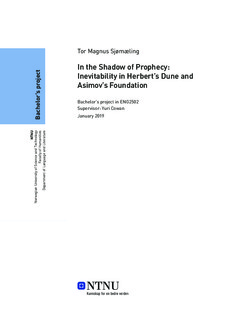I skyggen av profeti: Uungåelighet i Herberts Dune og Asimovs Foundation
Bachelor thesis
Permanent lenke
http://hdl.handle.net/11250/2610038Utgivelsesdato
2019Metadata
Vis full innførselSamlinger
Sammendrag
Profetier er rotfestet i idéen om potensial. I motsetning er dette samme potensialet også knyttet til uungåelighet. Uten denne spenningen mellom uungåelighet og potensial vil potensialet i profetier falle sammen. Frank Herberts Dune og Isaac Asimovs Foundation serie er begge science fiction romaner med handlinger om profetier som er knyttet sammen med temaet uungåelighet. Vi vil ta et nærmere blikk på Paul Atreides maktkamp i Dune, og handlingene i Foundation romanene og hvordan en profeti lykkes i å beskytte en hel nsjon på egenhånd. Formen for uungåelighet som vi ser i disse romanene vekker gode spørsmål om den underliggende kreftene bak slike profetier, hvordan personlig ansvar over fremtidige hendelser betyr noe i møte med en uungåelig fremtid som allerede er skrevet, hva invirkningene av disse profetiene er i disse two fiksjonelle romanene og hvordan de påvirker sine helter og sitt univers. Det er viktig å etablere hvem det er som har overtaket over hvem og om det er fremtidig historie, altså profetien, som styrer individet, eller om det er individet som kontrollerer deres egen skjebne. Hvis profetier er ment å bringe modning og potensial så må vi forstå hvordan dette potensialet kan knyttes sammen med uungåelighet som er et element som ikke vanligvis kombineres med noe så håpefullt som potensial. En annen viktig komponent i utfoldingen om romanenes profetier er kaosteori som vil bli brukt til å forklare de indre funksjonene til uungåelighet som tilhører disse to tekstene. Til å utforske denne spenningen mellom potensial og uungåelighet vil avhandlingen benytte seg av Frank Herberts Dune fra 1965 og Isaac Asimovs Foundation, Foundation and Empire og Second Foundation romaner fra 1951, -52 og -53 henholdsvis. Prophecies are rooted in the idea of potentiality. In contrast, this same potentiality is also concerned with inevitability. Without this tension between inevitability and potentiality, the potentiality of prophecies falls apart. Frank Herbert’s Dune and Isaac Asimov’s Foundation series are both science fiction novels with plots about prophecies interconnected with the theme of inevitability. We will be taking a closer look at Paul Atreides’ rise to power in Dune, and the events of the Foundation novels and how one prophecy succeeds in defending a nation singlehandedly. The type of inevitability we see in these novels raise valid questions revolving the driving forces behind these prophecies, how personal responsibility of future events matter in the face of an inevitable future that is already written, what the ramifications of these prophecies are in these two fictional novels and how they affect its heroes and universe. It is vital to establish who holds precedence over whom and whether it is future history, or prophecy, that puppeteers the individual, or the individual who controls their own destiny. If prophecies are meant to be the bringers of growth and potentiality, then we need to understand how this potentiality ties into inevitability which is an element not usually depicted with something as hopeful as potentiality. Another important component to unfolding the novels’ prophecies is chaos theory which will be used to explain the inner workings of inevitability pertaining to these two specific narratives. In exploring this tension between potentiality and inevitability, this paper will utilise Frank Herbert’s Dune from 1965 and all of Isaac Asimov’s Foundation, Foundation and Empire and Second Foundation novels from 1951, -52 and -53, respectively.
